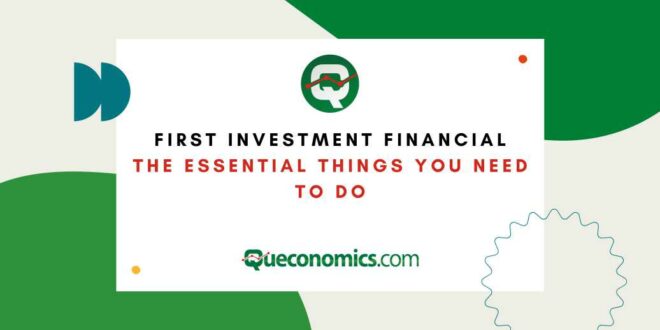Table of Contents
Queconomics – Most successful investors must have passed their first investment financial. They did not create their successful process in a day. They learn the ins and outs of the financial fields.
They build personality and habits as a professional investor with patience and dedicating their time. Here are some essential things you need to do before starting your investment.
First Investment Financial, A Household Budget
First, you need to prepare a household budget. It helps you reach the surplus that can be invested after accounting for the total household expenses and income.
When budgeting for your first investment financial, you will list your various sources of income. It includes rental income, salary (your spouse and you), dividends, interest on deposits, et cetera.
After that, make a list of expenses in a month and allocate money for each head. Everything must be included, such as EMI for various loans, fuel expenses, and grocery bills.
To get a clear figure in your head, break down your income and expenses quarterly, or half-annually, or monthly. It can be a beneficial tool in financial planning. In about 2-3 months, you will see your spending pattern.
It can tell you where you can get more out of cutting back on your spending habits. You can plan short- and long-term financial goals with your saving pattern. Include your child’s education, a new car, or a vacation.
Debt Free
Planning to eliminate debt as early as possible, if you have one. An investor can earn a return per year, say 12 percent on one’s investment portfolio. But, if they pay a similar percentage due to interest on the loan, the investor will not create wealth with the net effect.
Debt can come in many forms, such as credit cards, personal loans, car loans, et cetera. They are unconstructive loans, while the home loan is a construction loan.
Personal loans can range between 13 and 18 percent, while home loans at around 9 percent per year. The interest rate that a person pays on a credit card outstanding balance (after rolling) per year is between 36-48 percent.
Remember, one’s credit history can be shaped by proper use of debt for future loans needs. Get your credit report copy from the credit bureaus and check your score.
Adequate Protection
Before your first investment financial, make sure that your health costs, the house you live in, and your existing assets are well protected. It can be best accomplished using a risk management tool which is insurance.
Among the initial steps in planning for finance is guarding against medical expenses. Hospitalization due to an accident or illness can affect anyone at any time in the family.
Prepare an Emergency Fund
Unless you have an emergency fund, first investment financial in the long term may be futile. An emergency comes unpredictable and requires immediate action.
There may be a deterioration in the capacity of one’s earnings because of loss of job within a few months or a temporary disability. Even in the time when claims take time for settlement, a medical emergency may arise.
Reaching Goals
Achieve the goal is always easier and better by planning one’s trip after determining the destination. A planned itinerary is valuable in making optimum and efficient use of available resources.
Similarly, you need to identify your life goals in advance before starting to achieve them. Set the goals in plain sight and make separate plans to reach each one.
The Final Words
Most investors think that financial planning is similar to investment planning which is only part of the former. Once you make the financial plan, consider the assets you desire to be allocated based on your goal horizon and risk profile.
After that, you must take the final step towards a good financial plan. Now, look at the proper investment ways for Your first investment financial.
 Queconomics Guide to your economic growth
Queconomics Guide to your economic growth
